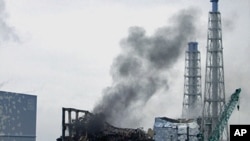Japanese workers were forced Monday to evacuate from the crippled Fukushima nuclear power plant after dark smoke rose from one of the facility's six reactors.
Officials said that there had been no immediate increase in radiation levels and the cause of the smoke was under investigation.
The plant's operator, Tokyo Electric Power Company, says abnormally high levels of radioactive substances have been found in the Pacific Ocean along Japan's northeastern coast. But they are not considered a threat to human health.
With the number of dead or missing from the March 11 earthquake and tsunami reaching beyond 21,000, the hope of finding any more survivors is declining. Some 350,000 have been left homeless.
The World Bank estimates that the economic cost of the disaster at $235 billion, the equivalent of four percent of Japan's annual economic output.
The head of the International Atomic Energy Agency (IAEA), Yukiya Amano, told reporters in Vienna, Austria on Monday that while the situation at the Fukushima plant is serious, he remains confident the crisis will be "effectively overcome."
The Japanese government has suspended all raw milk shipments from Fukushima and spinach from all four prefectures surrounding the plant after unacceptably high radioactive levels were found in the products. But government officials added that the levels did not pose an immediate health risk.
The U.S. government Monday made potassium iodide available to U.S. personnel and dependents in several prefectures, including Tokyo, as a precautionary measure. Potassium iodide protects the thyroid gland against radiation.
Some information for this report was provided by AP, AFP and Reuters.




